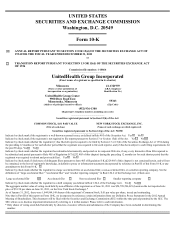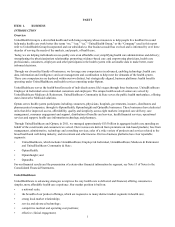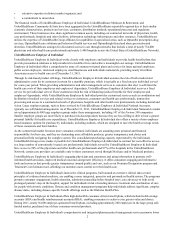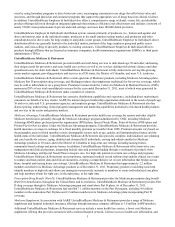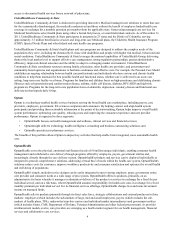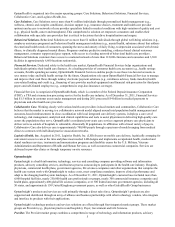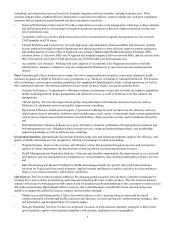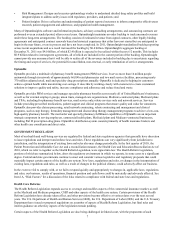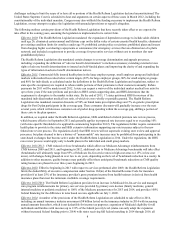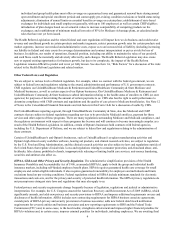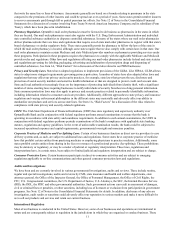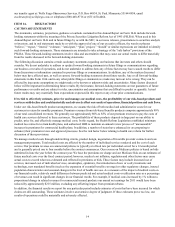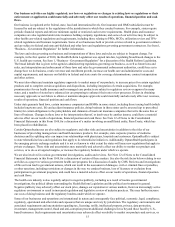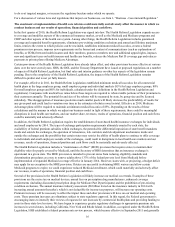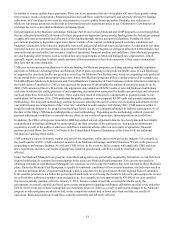United Healthcare 2011 Annual Report Download - page 11
Download and view the complete annual report
Please find page 11 of the 2011 United Healthcare annual report below. You can navigate through the pages in the report by either clicking on the pages listed below, or by using the keyword search tool below to find specific information within the annual report.9
individual and group health plans must offer coverage on a guaranteed issue and guaranteed renewal basis during annual
open enrollment and special enrollment periods and cannot apply pre-existing condition exclusions or health status rating
adjustments; elimination of annual limits on essential benefits coverage on certain plans; establishment of state-based
exchanges for individuals and small employers (generally, with up to 100 employees) as well as certain CHIP eligibles;
introduction of plan designs based on set actuarial values to increase comparability of competing products on the
exchanges; and establishment of minimum medical loss ratio of 85% for Medicare Advantage plans, as calculated under
rules that have not yet been issued.
The Health Reform Legislation and the related federal and state regulations will impact how we do business and could restrict
revenue and enrollment growth in certain products and market segments, restrict premium growth rates for certain products and
market segments, increase our medical and administrative costs, expose us to an increased risk of liability (including increasing
our liability in federal and state courts for coverage determinations and contract interpretation) or put us at risk for loss of
business. In addition, our results of operations, financial position, including our ability to maintain the value of our goodwill,
and cash flows could be materially and adversely affected by such changes. The Health Reform Legislation may also create
new or expand existing opportunities for business growth, but due to its complexity, the impact of the Health Reform
Legislation remains difficult to predict and is not yet fully known. See also Item 1A, “Risk Factors” for a discussion of the risks
related to the Health Reform Legislation and related matters.
Other Federal Laws and Regulation
We are subject to various levels of federal regulation. For example, when we contract with the federal government, we are
subject to federal laws and regulations relating to the award, administration and performance of U.S. government contracts.
CMS regulates our UnitedHealthcare Medicare & Retirement and UnitedHealthcare Community & State Medicare and
Medicaid businesses, as well as certain aspects of our Optum businesses. Our UnitedHealthcare Medicare & Retirement and
UnitedHealthcare Community & State businesses submit information relating to the health status of enrollees to CMS (or state
agencies) for purposes of determining the amount of certain payments to us. CMS also has the right to audit performance to
determine compliance with CMS contracts and regulations and the quality of care given to Medicare beneficiaries. See Note 12
of Notes to the Consolidated Financial Statements and risk factors in this Form 10-K for a discussion of audits by CMS.
Our UnitedHealthcare reporting segment, through UnitedHealthcare Community & State, also has Medicaid and CHIP
contracts that are subject to federal regulations regarding services to be provided to Medicaid enrollees, payment for those
services and other aspects of these programs. There are many regulations surrounding Medicare and Medicaid compliance, and
the regulatory environment with respect to these programs has become and will continue to become increasingly complex as a
result of the Health Reform Legislation. In addition, certain of Optum's businesses hold contracts with federal agencies,
including the U.S. Department of Defense, and we are subject to federal law and regulations relating to the administration of
these contracts.
Certain of UnitedHealthcare's and Optum's businesses, such as UnitedHealthcare's eyeglass manufacturing activities and
Optum's high clinical acuity workflow software, hearing aid products, and clinical research activities, are subject to regulation
by the U.S. Food and Drug Administration, and the clinical research activities are also subject to laws and regulations outside of
the United States that regulate clinical trials. Laws and regulations relating to consumer protection, anti-fraud and abuse, anti-
kickbacks, false claims, prohibited referrals, inappropriately reducing or limiting health care services, anti-money laundering,
securities and antitrust also affect us.
HIPAA, GLBA and Other Privacy and Security Regulation. The administrative simplification provisions of the Health
Insurance Portability and Accountability Act of 1996, as amended (HIPAA), apply to both the group and individual health
insurance markets, including self-funded employee benefit plans. HIPAA requires guaranteed health care coverage for small
employers and certain eligible individuals. It also requires guaranteed renewability for employers and individuals and limits
exclusions based on pre-existing conditions. Federal regulations related to HIPAA include minimum standards for electronic
transactions and code sets, and for the privacy and security of protected health information. The HIPAA privacy regulations do
not preempt more stringent state laws and regulations that may also apply to us.
Federal privacy and security requirements change frequently because of legislation, regulations and judicial or administrative
interpretation. For example, the U.S. Congress enacted the American Recovery and Reinvestment Act of 2009 (ARRA), which
significantly amends, and adds new privacy and security provisions to HIPAA and imposes additional requirements on uses and
disclosures of health information. ARRA includes new contracting requirements for HIPAA business associate agreements;
extends parts of HIPAA privacy and security provisions to business associates; adds new federal data breach notification
requirements for covered entities and business associates and new reporting requirements to HHS and the Federal Trade
Commission (FTC) and, in some cases, to the local media; strengthens enforcement and imposes higher financial penalties for
HIPAA violations and, in certain cases, imposes criminal penalties for individuals, including employees. We are awaiting final

